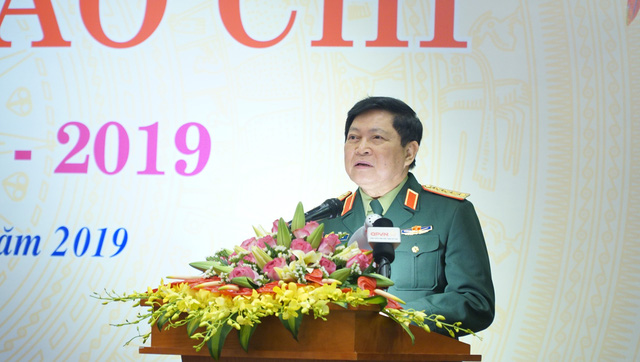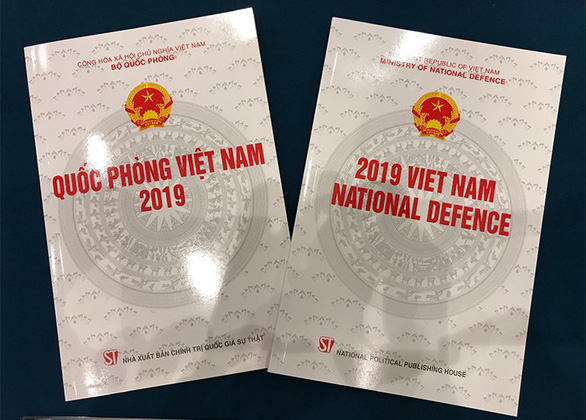The military will frequently train itself in order to properly handle “situations in cyberspace” and let Vietnam not be surprised by any attack in this “new territory,” according to the Southeast Asian country’s defense chief.
Minister of National Defense General Ngo Xuan Lich granted the Vietnam News Agency an interview on the occasion of the 75th anniversary of the People’s Army of Vietnam (December 22, 1944 – December 22, 2019).
Asked to elaborate on the Vietnamese military’s stance on cyberspace protection besides its mission to defend Vietnam’s land, sky, and seas, Minister Lich said cyberspace has become a “new territory” for countries to use for their economic growth, given the advancement of information technology and telecom sectors.
Those countries will also defend their cyberspace to maintain socio-political stability while ensuring national interests and sovereignty, the minister added.
The online environment has grown into a new battlefield, giving rise to new forms of warfare that strongly affects the defense, security, and peace of every country in the world.
General Lich underlined that his ministry had directed all forces to closely monitor all developments and provide early and timely warnings for the state and Communist Party of Vietnam to “well handle situations in cyberspace.”
The military will “mobilize resources and equipment while frequently training and cooperating with each other so as to safeguard the country’s cyberspace right in peacetime,” the defense chief told the Vietnam News Agency.
“[We will not] let the country be surprised,” he added.
He also noted that the military will be streamlined to create comprehensive power and increasing might so it can well protect the nation – on land, in the sky, and at sea.
In a meeting with the defense chiefs of Brunei, Cambodia, China, Indonesia, Laos, Malaysia, Myanmar, Russia, Singapore, and Thailand to celebrate the 75th anniversary of the Vietnam People’s Army, Prime Minister Nguyen Xuan Phuc underscored that Vietnam follows a defense policy of peace and self-defense, as clarified in the 2019 Vietnam National Defense, or the Defense White Paper, released in November.
|
|
| The 2019 Vietnam National Defense was released on November 25, 2019. Photo: Tuoi Tre |
Four No’s
The Ministry of National Defense announced the 2019 Defense White Paper on November 25, underling its ‘Four No’s’ policy.
Vietnam will not join any military alliance, will not align itself with one country to go against another, will not allow a foreign country to establish a military base on its soil or use its territory to counter another, and will not use force or threaten to use force in international relations, Deputy Minster of National Defense Colonel General Nguyen Chi Vinh said at the launch of the book in Hanoi.
The Southeast Asian country will boost defense cooperation with various nations to improve its self-defense and capability to tackle common security challenges.
Vietnam will consider cemeting necessary defense ties on the basis of respect for independence, sovereignty, territorial integrity, and international law.
“We’re not hestitant to introduce the weapons of the Vietnam People’s Army in the 2019 White Paper, which expresses the transparency of Vietnam’s defense policy,” Deputy Minister Vinh said.
“Our weapons are strong enough to protect our country but they are not meant to harm any other country.”
Vietnam does not have any intention of leading the Association of Southeast Asian Nations (ASEAN), as it merely wants to actively and positively engage in the grouping for the sake of peace, security, and cooperation, Deputy Minister Vinh said.
The 2019 Defense White Paper shows that the nature of Vietnam’s defense policy is peace and self-defense, said Major General Nguyen Van Than, deputy director of the Institute for Defense Strategy.
Vietnam’s spending on defense accounted for 2.23 percent of GDP in 2010, which rose to 2.82 percent in 2011, and 2.88 percent in 2012.
The budget was hiked to 2.51 percent of GDP in 2017.
In 2018, Vietnam spent US$5.8 billion on defense, occupying 2.36 percent of its GDP.
The 2019 Defense White Paper is available in English and Vietnamese to domestic and foreign agencies, embassies, and military attachés.
Vietnam already released the White Paper in 1998, 2004, and 2009.
Like us on Facebook or follow us on Twitter to get the latest news about Vietnam!


















































